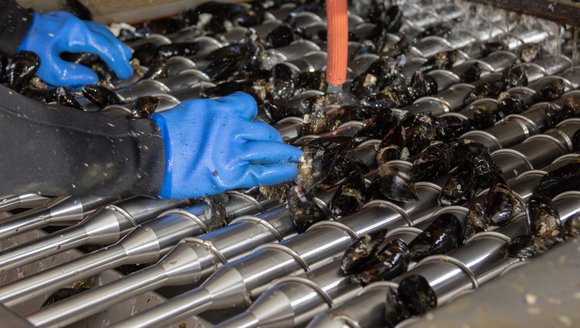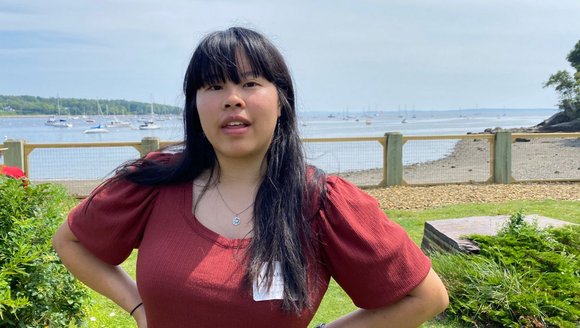Advancing Aquaculture
Supporting the growth of the aquaculture industry in the Gulf of Maine.
The sustainable aquaculture sector in the Gulf of Maine is growing, and its potential to bolster the blue economy in our region is clear. To support the growth of the aquaculture industry here in Maine, we work collaboratively with industry leaders, farmers, researchers, the business community, and other nonprofits to identify and pursue opportunities that will secure its healthy future. Together, we can help the industry meet rising workforce demands, and provide the kinds of business planning and training resources that will lead to long-term profitability.
Aquaculture Projects
Explore the different ways in which we work to expand and support aquaculture industry in the Gulf of Maine.
-
![Maine Farmed Shellfish Market Analyses]()
Maine Farmed Shellfish Market Analyses
This project has produced two data-driven, quantitative market assessments to inform industry leaders and business owners about the potential scale and scope of markets for …
-
![Maine Aquaculture Apprenticeship Program]()
Maine Aquaculture Apprenticeship Program
This project aims to establish core aquaculture workforce training programs — identified as fundamental to sustainable growth of the industry in the Maine Aquaculture Workforce …
-
![The Maine Aquaculturist]()
The Maine Aquaculturist
The Maine Aquaculturist, an aquaculture knowledge portal, is a comprehensive, accessible, and practical information portal that assists commercial aquaculture businesses in understanding and utilizing business-relevant …
-
![Supporting the Development of Socioecological Literacy]()
Supporting the Development of Socioecological Literacy
This project advances efforts to better understand and promote practices that broaden access to and interest in regionally relevant science, technology, engineering, and math (STEM) …
-
![Mussel Bed Mapping]()
Mussel Bed Mapping
Mussel beds are inching towards more subtidal zones, and are becoming harder to spot. During extreme low tides, you might be able to get a …
-
![With a Little Kelp from our Friends!]()
With a Little Kelp from our Friends!
Led by Maine Aquaculture Innovation Center, GMRI and partners aim to increase the use of seaweed aquaculture resources in Maine K-12 classrooms. This project provides …
-
![Maine Aquaculture Workforce Development Strategy]()
Maine Aquaculture Workforce Development Strategy
In Maine’s aquaculture industry the workforce shortage has been an obstacle to growth for many businesses. This in-depth analysis aims to help determine the current …
-
![Commercial Oyster Demonstration Farm Partnership]()
Commercial Oyster Demonstration Farm Partnership
Our project documents the growth of a small oyster farm as it scales to commercial level operations. By keeping track of the successes, challenges, financial …
-
![South Portland Pier Aquaculture and Fishing Needs Assessment]()
South Portland Pier Aquaculture and Fishing Needs Assessment
In 2017, GMRI’s Aquaculture Program partnered with the City of South Portland and GEI Consultants to develop a Master Plan or long-term vision for the …

NEW: Maine Farmed Shellfish Market Analysis
Maine remains in an excellent position to further develop its aquaculture industry and capture a greater share of the shellfish marketplace for oysters, mussels, and scallops. Since our 2016 market report, the state has retained its competitive advantages. Read our new report to learn more.
What is aquaculture?
Aquaculture is the practice of growing seafood in a controlled setting, as opposed to harvesting wild populations. Roughly half of all global seafood production comes from aquaculture, and that number is growing rapidly, outpacing wild-harvest production rates. From Atlantic salmon, oysters, mussels, and eels to sea vegetables like kelp, the variety of farmable seafood is vast and growing. Sea farmers and researchers are working to develop techniques for growing additional species like sea scallops, soft-shell clams, hard-shell clams, and additional species of marine algae.
Why aquaculture?
Aquaculture is playing an increasingly important role in the Gulf of Maine. The growing industry has the potential to support livelihoods and our coastal communities, strengthen our working waterfronts, and improve the outlook of long-term local and global food-security.
For those reasons and more, we were inspired to launch an aquaculture program at GMRI to support the growth of the aquaculture industry in the Gulf of Maine. Successful aquaculture approaches produce some of the most sustainable and nutritious food available anywhere, but running a lucrative aquaculture business requires a lot of hard work and careful considerations.
Our role
The sustainable aquaculture sector in the Gulf of Maine is growing, and its potential to bolster the blue economy in our region is clear. To support the growth of the aquaculture industry here in Maine, we work collaboratively with industry leaders, farmers, researchers, the business community, and other nonprofits to identify and pursue opportunities that will secure its healthy future. Together, we can help the industry meet rising workforce demands, and provide the kinds of business planning and training resources that will lead to long-term profitability.
For more than a decade, we've worked to ensure that the Gulf of Maine’s rich and productive ecosystem supports an array of wild fisheries, as well as the communities that depend upon them. An expanded aquaculture industry doesn’t need to get in the way of healthy wild fisheries, either. In fact, the two approaches depend on a clean environment, a solid understanding of the Gulf of Maine ecosystem, thoughtful management strategies, innovative leadership, and an informed and supportive public. The combination of healthy wild-harvest fisheries and aquaculture farms will help our region meet the challenges of feeding growing populations and adapting to a warming climate.












